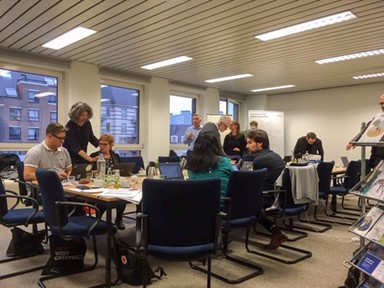Developing the annotated bibliography
Identifying the key areas of children’s digital lives
We began by asking members of the CO:RE network, in a workshop-style group discussion, to identify the concepts central to research and evidence regarding children’s digital lives.

Expert consultation meeting, January 2020
We arranged and systematised the concepts that they suggested to identify key conceptual areas. These key areas of children’s digital lives were reviewed during follow-up project meetings, and expanded and defined, resulting in nine final key areas (see diagram at the beginning of the bibliography).
Creating a bibliography with guided reading lists
Next, we organised an online consultation inviting members of the CO:RE network and selected experts on children’s internet use from different subfields to map relevant theories, concepts and disciplines, and to identify priorities and resources in each of the nine areas. The results were organised and summarised in this annotated bibliography.
This annotated bibliography is designed to answer these questions:
If someone was beginning research on X (say, wellbeing or risk) in relation to children online, what must they read? What theories or approaches might they find particularly promising?
What sources have CO:RE members themselves found insightful in guiding their thinking on key concepts? And why? Do they raise interesting new research questions?
This resource is not intended to work as a library, nor to dictate any ‘correct’ or ‘ideal’ way to research children online. We offer a road map to get started, and some interesting directions to pursue.
The consultation for developing the bibliography followed a snow-balling process – we first approached members of the CO:RE consortium who shared their ideas about the key concepts, theories and resources, and identified gaps and priorities. We then consulted members of the largest European network working on children’s use of digital technologies – EU Kids Online, with members in 34 countries across Europe – who made further suggestions. We used an online forum to invite recommendations from the Children, Youth and Media network at the European Communication Research and Education Association, a Europe-wide network for researchers and educators. We also invited its members to suggest ways in which the output from the consultation – the annotated bibliography – could be utilised and who might benefit from it. Finally, we made the bibliography available online as a shared working document, and shared on social media an invitation for contributions. Each week we shared a different concept and a link where people could add their suggestions.
After that the bibliography was maintained as an ‘open document’ and work in progress over the duration of the project, allowing it to continue to change as we debated the contents and added new sources.
Updating and expanding the bibliography
To update and expand the bibliography, we conducted an online consultation focusing on Topics and Theories in Circulation. It aimed to identify the “state of the art” in current research and theorising. Seeking input from a range of early career and established researchers and research users across different disciplines, the consultation aimed to explore the main themes in their current research and their theoretical interests and work.

Expert consultation on theories in circulation – image used on social media
The participants were provided with the opportunity to discuss the theories for researching children’s digital lives they used in their work. The consultation participation included submitting written answers to the following four questions:
What theory do you cite most often in your work?
How is this theory helpful in your work?
Can you give a brief summary of what this theory says?
What sources are useful for researchers to read about this theory?
A total of 90 written responses were received and used to update the bibliography. The consultation discussions focused on individual interests and experiences with theory, key theories used and how they were applied in practice, as well as suggestions for key resources on these theories.
The most substantial contribution of the consultation relates to the breadth of theoretical examples and their explanations received, substantially widening and deepening the scope of the existing reading lists. Our findings show that current theorising of children’s digital lives includes a range of “classic” and “new” theories draws on considerable disciplinary diversity and richness. Some of the popular theories in circulation can be described as “grand theories”– addressing multiple aspects of children’s everyday lives and development. Other theories are mid-range theories, tackling particular aspects of children’s digital engagement.
We thank all the experts who contributed to the consultations and helped us create this resource.










